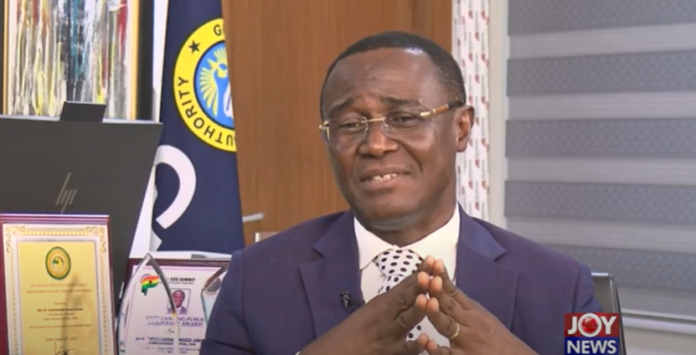The Ghana Revenue Authority (GRA) has disclosed it will soon go after accounts of Ghanaians overseas who are not paying taxes.
This was after it carried out some work on 70,000 accounts of Ghanaians living in 40 countries.
Commissioner General of the Ghana Revenue Authority, Rev. Dr. Ammishaddai Owusu-Amoah, disclosed this on PM Express Business edition with host George Wiafe.
“For the 40 countries that we have completed work, the value of money in these accounts are pegged at $2.8 billion”, he stated.
“However, the Ghana Revenue Authority has been able to raise a tax liability of $1.6 billion. This is an assessment, but doesn’t mean that we have already collected the taxes on these accounts”, the GRA Boss added.
Rev. Dr. Ammishaddai Owusu-Amoah pointed out that this was based on work done in two months by the GRA.
The Commissioner General also revealed that his outfit is expecting another set of data to come in the first week of January 2024, which could also improve the inflows expected.
Reasons and legal basis by GRA
The Commissioner-General of the GRA said it is getting information from the Organization for Economic Co-operation and Development (OECD) Agreement on automatic exchange of information with member countries and the exchange of information on request.
According to him, 150 countries including Ghana have signed up to this agreement by the OECD, which allows member countries to share information based on request and the automatic sharing of information. The agreement allows Ghana to share information with member countries
“This means that Ghana can go to UK and ask for information on Ghanaians resident in that country and the UK can also request that GRA shares information on their residents in Ghana”, Dr Owusu-Amoah pointed out.
The development, he added, will also help in checking money laundering as well.
“Ghana is one of the 5th countries in Africa in which in 2022 managed to satisfy all the conditions to be part of the OEDC agreement on sharing data for tax purposes on residents in their countries,” the GRA Boss revealed.
What will happen to residents in Ghana who don’t cooperate?
Rev. Dr. Ammishaddai Owusu-Amoah furthered that persons who fail to meet their tax obligations will be given some time to comply with the GRA.
However, failure to do so will result in the Authority going ahead to apply the necessary penalties.
GRA and Foreign Nationals and Businesses in Ghana
The Commissioner General also revealed that the Authority will soon roll out a Special Voluntary Disclosure Program (SVDP) for foreign nationals and businesses in the country.
This will allow foreign nationals in Ghana, including individuals and businesses to voluntarily disclose any unreported or underreported information related to their financial activities outside Ghana for tax purposes.
The initiative is coming under the Multilateral Competent Authority Agreement (MCAA) and the Standard for Automatic Exchange of Financial Account Information in Tax Matters Act, 2018 (Act 967).
Rev. Dr. Ammishaddai Owusu-Amoah also explained that the Voluntary Disclosure Programme encourages participants to voluntarily disclose their errors or omissions and may be eligible for a reduction in penalties that would typically apply to such violations.
He also added that “All information provided under the Voluntary Disclosure Programme will be treated with utmost confidentiality, whilst stringent protocol measures have been put in place to protect the security and privacy of your data.
ALSO READ:

